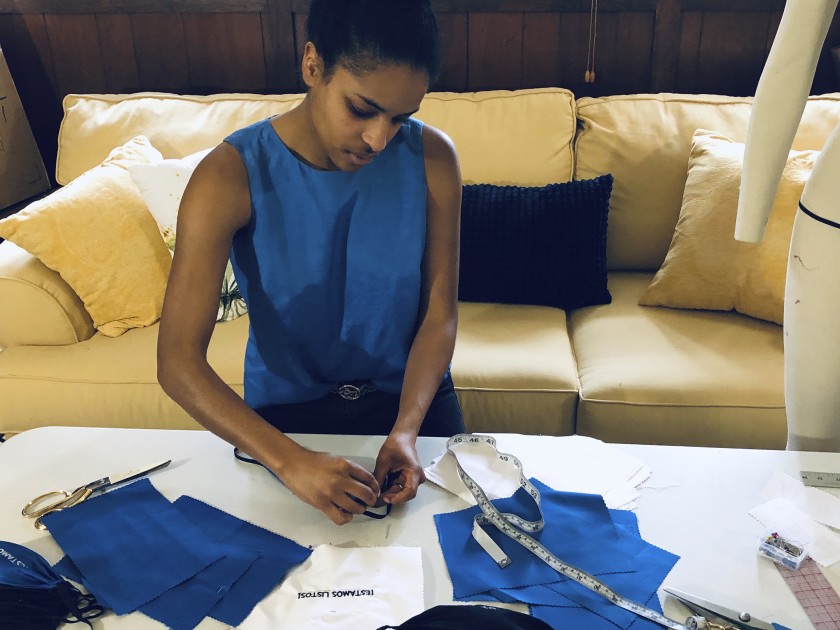|
“Call a person over in Venezuela,” blustered the man with the orange goo slathered on his face.
“Ask them how did nationalization of their businesses work out? Not too well." The Dear Leader was responding to questions about why the American government was not mobilizing businesses to make the masks and respirators needed for endangered health-care people to care for endangered patients. He’s all for Congress supplementing his friends in big business in this crisis. He just doesn’t want to tell them what to do with the money. This in a country that mobilized auto plants to produce airplanes during World War Two, as David Leonhardt recalled in the NYT on Monday. This in a country where hospitals are begging people to donate masks and other medical goods they are “storing” in their homes, in order to save the actual sick, until The Orange Guy thinks of something. Ordinary citizens are sewing masks in their homes, patriots in the old style, because the federal government cannot get a handle on this. I immediately thought of an entitled woman I met in Cuba, making soap in her own kitchen. I said “soap,” not “soup.” I met the woman when I covered the Pan-American Games in Havana in 1991. A friend in New York had told me about her, a talented woman who had gone to school in the States, had a medical background, whose husband, a high-ranking officer, had fought and died for his country. She was eager to be my guide to the complicated world of Cuba, when I was not directly covering sports issues during the Games. She was loyal to the country and she knew how things worked, and did not work. She had a car, one of those classic 50s cars, in good shape, and took me around Havana as well as the Bay of Pigs, where her husband had served. For a sense of how people lived, she took me to her building, in a genteel if fading neighborhood. The lights were out on the stairway. The apartment was roomy, if dated. They had raised their family there, and now some members were doctors, working in the state hospital. She pointed at the stove, at a pot of soap slivers in water, waiting for her children and their spouses to bring home more soap remainders from the hospital, so she would boil them down, sanitize them, turn them into something approximating soap bars. “I’ve become my own grandmother,” she said. I think of her remark and those soap scraps now that Americans are begging the federal government to supply the goods to keep them alive. I think of our portly poseur, who has fooled some Americans into thinking he has business sense, any sense at all. He wants American money in the hands of Mnuchin and other gunnysack cabinet members rather than in the hands of the people who do the work. He’s not going to induce American enterprises into making make goods needed by endangered people. Medical people are begging for equipment, but this is not his department. He has his principles. He rolls over and plays nice for Putin and Kim but he talks big about Venezuela. His instincts are toward one-man rule. On Monday it seemed he had disappeared Dr. Anthony Fauci, an authority on the virus who lately has been verbalizing some of his concerns. Fauci was missing from the press conference Monday, like some Politburo big shot who had been airbrushed out of a group photo. Maybe Fauci would return on Tuesday. To be continued. In the meantime, thank goodness we are not a third-world country like Cuba, like Venezuela. * * * Trump’s Venezuela babble: https://www.npr.org/sections/coronavirus-live-updates/2020/03/23/819926854/fact-check-trump-compares-defense-production-act-to-nationalization David Leonhardt’s riff on mobilization before World War Two: https://www.nytimes.com/2020/03/22/opinion/trump-coronavirus.html?searchResultPosition=4 * * * QUESTION: A friend asked me yesterday if he could be put on my email list for my occasional rant. I said there is no such mailing list; I put my precious little ramblings out there on the Web like a message in a bottle, tossed out to sea, and hope people find it. Only rarely do I send something directly to a friend. Could I get a show of hands from anybody who would like to be on a totally-anonymous and confidential list for these occasional pieces? Thanks. My email is: [email protected] NB: Comments here are welcome. Nay, beseeched. GV.
Randolph
3/24/2020 01:58:11 pm
George,
bruce
3/24/2020 02:24:49 pm
george, 3/26/2020 02:19:27 pm
It was refreshing to watch Gov. Cuomo this morning on TV. He very clearly defined the situation, where the state of NY is and where it needs to go.
Gene Palumbo
3/27/2020 12:00:29 am
George, You asked, "Could I get a show of hands from anybody who would like to be on a totally-anonymous and confidential list for these occasional pieces?" Not sure I understand why that would be necessary, or what advance it would represent. We all check your blog often, so we know when there's been a new post. Then again, maybe we all have times when we're so busy that we simply don't check in for a week or so, and maybe, on such occasions, it would be nice to get an email from you midweek saying, hey, folks, there's a new post.
bruce
3/27/2020 12:33:36 am
gene,
George
3/28/2020 07:53:16 am
A Cuomo fund-raiser. Comments are closed.
|
Categories
All
|










